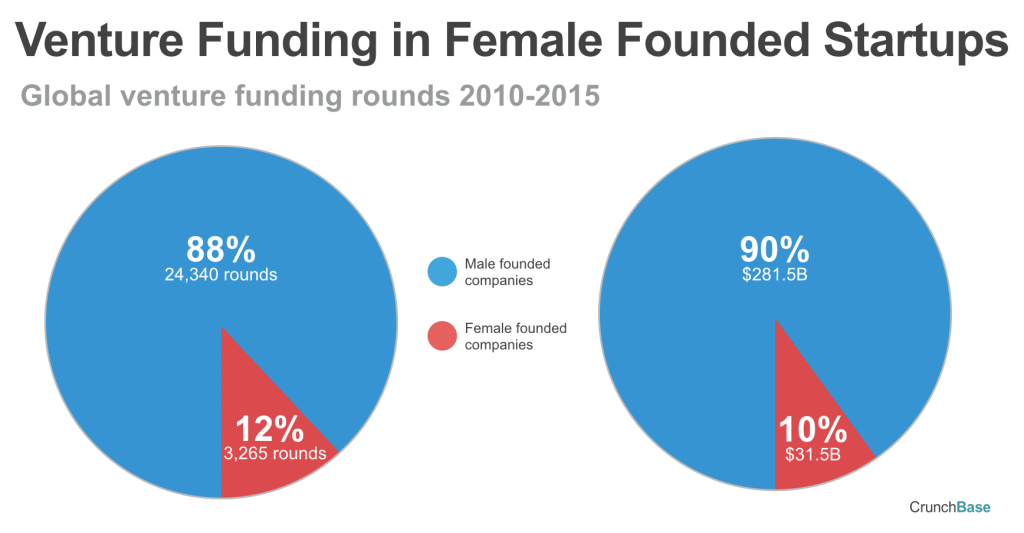Are women less likely to become entrepreneurs? – StartupSmart

By Robert M. Sauer
A great deal of attention is paid to the glass ceiling that prevents women from climbing the corporate ladder. The under-representation of women at the executive level in large corporations is thought to be one of the main obstacles to female economic empowerment.
But there is an additional obstacle that is less widely publicised – and just as debilitating. This is the glass ceiling that women face when they want to become self-employed and start their own business.
This is the finding of new research, recently published by my colleague Tanya Wilson and I in the European Economic Review.
We found that, at a time where self-employment and small business activity is an increasingly important feature of most advanced economies, women are held back when it comes to starting and growing their own businesses by significant financial constraints that are stronger for them than for men.
Not only is this bad for gender equality, it is also bad for the wider economy. Self-employment and small business activity have become increasingly important features of most advanced economies.
In the UK, for example, small firms now account for 48% of all private sector employment, and increases in total employment since the start of the Great Recession have been mostly driven by the growth in self-employment.
Recent rise in women entrepreneurs
Meanwhile a sharp rise appears to be taking place in women engaged in entrepreneurial activity. Official UK labour force surveys show that from 2009 to 2014, the proportion of men in self-employment increased by 6%. Over the same period, the proportion of self-employed women jumped by a remarkable 22%.
But women still face severe obstacles as entrepreneurs, just as they do when trying to advance within large corporations. One of the main problems women face is access to the funds necessary to start a business or expand an existing one. A glass ceiling emerges for women in self-employment when they suffer relatively more from these liquidity constraints than their male counterparts do.
Our study used data from the official survey of UK wealth and assets to try and detect the existence of liquidity constraints for entrepreneurs. It showed a strong relationship between personal wealth and entrepreneurial activity. The greater one’s personal wealth is, the more likely they are to start a business.
The data also revealed evidence that this relationship between personal wealth and the propensity to start a new business is strongest among single women. Just £1,000 more money in the bank would lead to an 8.5% increase in the probability a single woman starts a new business.
Collateral damage
But women face a much harder job of securing access to the capital needed to start or grow their business – and single women especially. There are several possible explanations for this. It could be that single women have less collateral necessary for securing a loan such as a property.
There may be gender discrimination in the granting of credit. It is also possible that single women are highly risk averse and choose not to borrow money even when borrowed funds would be forthcoming.
While discrimination and different tastes for risk are generally hard to conclusively demonstrate, the data do reveal that women are less likely than men to acquire formal loans when starting a business. Plus, the lower propensity to acquire a formal loan among single women seems to be the consequence of a lack of collateral.
If this is the main obstacle preventing single women from engaging in entrepreneurship, and no market mechanisms emerge to help correct the situation, then a new public initiative that provides sufficient collateral to single women who lack access to funds might be one of those occasions where taxpayer money is well-spent.
Although public programmes that encourage business start-ups do already exist in the UK, they are generally quite restrictive and do not cover a large proportion of single women. An example is the New Enterprise Allowance, launched in 2011, which provides a weekly allowance for the first six months in self-employment and allows one to apply for a government-funded loan to help with start-up costs.
In 2013, a parallel initiative was introduced, called X-Forces. This programme extends eligibility for start-up funds to former military personnel and their families. However, the proportion of single women covered by this programme is also likely to be small.
Therefore, it would be of great social value if new private initiatives emerged that helped crack the glass ceiling in self-employment. However, if the private sector fails to correct the situation, then new public programmes could potentially help to further accelerate the recent rise of female entrepreneurship.![]()
Robert M. Sauer, Professor of Economics, Royal Holloway
This article was originally published on The Conversation. Read the original article.

